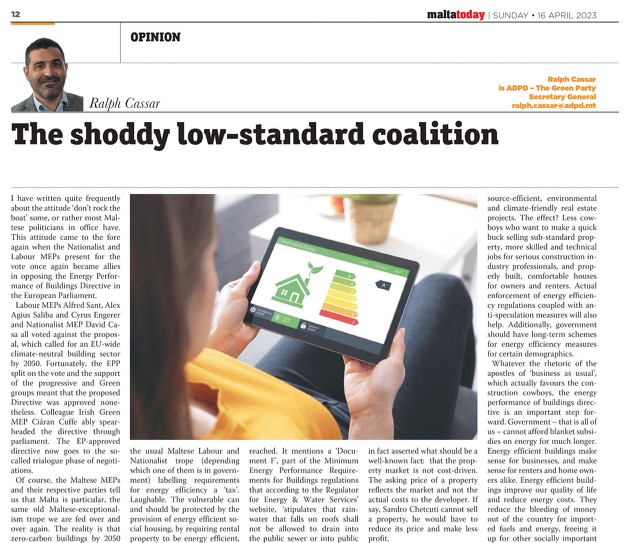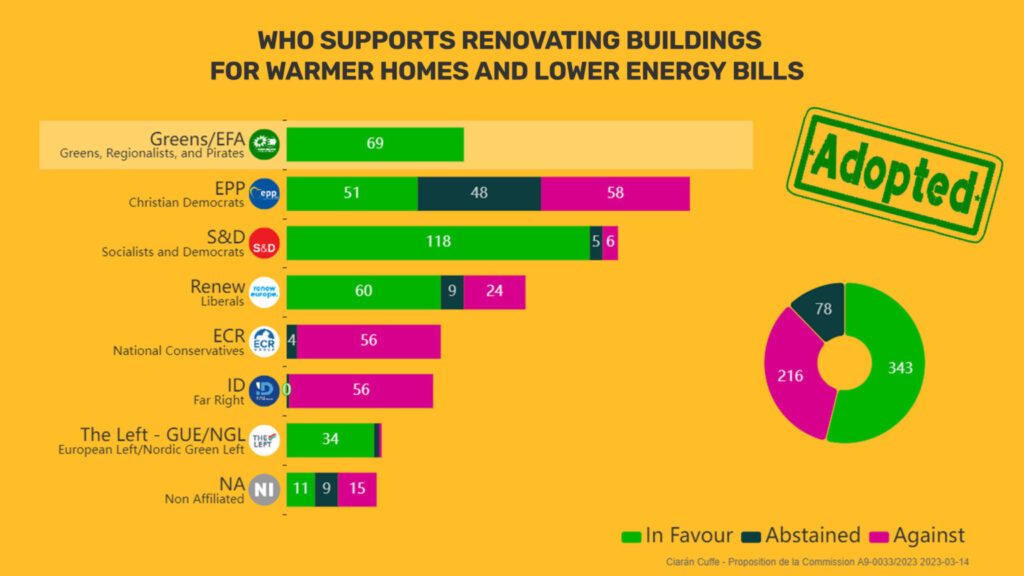
I have written quite frequently about the attitude ‘don’t rock the boat’ some, or rather most Maltese politicians in office have. This attitude came to the fore again when the Nationalist and Labour MEPs present for the vote once again became allies in opposing the Energy Performance of Buildings Directive in the European Parliament. Labour MEPs Alfred Sant, Alex Agius Saliba and Cyrus Engerer and Nationalist MEP David Casa all voted against the proposal, which called for an EU-wide climate-neutral building sector by 2050. Fortunately the EPP split on the vote and the support of the progressive and Green groups meant that the proposed Directive was approved nonetheless. Colleague Irish Green MEP Ciáran Cuffe ably spearheaded the directive through parliament. The EP-approved directive now goes to the so-called trialogue phase of negotiations.

Of course the Maltese MEPs and their respective parties tell us that Malta is particular, the same old Maltese-exceptionalism trope we are fed over and over again. The reality is that zero-carbon buildings by 2050 – and all the other intermediate targets – are necessary, important and beneficial to us all. What the Maltese MEPs did – and what the Maltese Government will probably do at EU Council level – is an attempt at procrastination, another gift to satisfy the greedy speculator-construction lobby, who want a business as usual scenario. Maltese governments have a history of pandering to this lobby, from the huge speculation-frenzy created by the Nationalist rationalisation and local plan debacle, to the constant changes in zoning and ‘exceptions’ as a thank you to Stivala and friends by Muscat, Abela and Labour.
Right on cue Labour MEPs Alex Agius Saliba and Cyrus Engerer, two of barely a handful of S&D MEPs voting against, bring up the ‘protection of the vulnerable’ excuse. Engerer also uses the usual Maltese Labour and Nationalist trope (depending which one of them is in government) labelling requirements for energy efficiency a ‘tax’. Laughable. The vulnerable can and should be protected by the provision of energy efficient social housing, by requiring rental property to be energy efficient, and by rent-support schemes. Government can also encourage housing cooperatives and affordable housing schemes. Energy efficient affordable housing and housing coops can actually push prices down by offering alternative and different housing options to people. What governments have done however is encourage a free-for-all and a weakening of standards over the years. We are in a risible situation where old buildings are actually more energy efficient than newer hollow-brick properties, to the shame of our so-called ‘leaders’.
A government commissioned report, paid for through EU funds, the Long Term Renovation Strategy 2050 (2021) speaks of a lack of enforcement of the minimum energy performance requirements for buildings and compliance mechanisms to ensure that the standards are reached. It mentions a ‘Document F’, part of the Minimum Energy Performance Requirements for Buildings regulations that according to the Regulator for Energy & Water Services’ website, ‘stipulates that rainwater that falls on roofs shall not be allowed to drain into the public sewer or into public place or thoroughfare but shall be collected in suitable wells or cisterns within the site of the building’. Surprise surprise the report says that this is ‘not being fully enforced’. Fully? It has not been enforced for ages. So is Malta supposed to be given any special treatment just because it fails to enforce even long standing regulations?
PN MEP hopeful Peter Agius also joins the bandwagon – at least he’s (shamefully, I would add) towing the EPP-line in opposing change and trying to sabotage the European Green Deal and Fit for 55 package. He says that prices of properties would go up by some 36,000 Euros. This assessment is simplistic. Professor Alex Torpiano, Dean of the Faculty of the Built Environment, when confronting speculator Sandro Chetcuti on TVM during a discussion programme Insights on the 3 of November 2022, has in fact asserted what should be a well-known fact: that the property market is not cost-driven. The asking price of a property reflects the market and not the actual costs to the developer. If say, Sandro Chetcuti cannot sell a property, he would have to reduce its price and make less profit. Despite their rhetoric in favour of ‘the people’ (whoever these ‘people’ are!), governments have actually pushed prices up by schemes enticing foreigners to buy property in Malta. The setting of a minimum purchase price has pushed up prices to artificially meet that minimum price, whatever the ‘quality’ of the property. Government incentives for say first time buyers, have also had the effect of pushing prices up by the value of the incentive. No wonder speculators lobby for such schemes.
If banks demand energy efficiency certificates as a condition for loans, and if they only lend for properly built properties then sellers will have to adjust their prices, and reduce their profits to actually make a sale. Bank of Valletta’s Chairman Gordon Cordina recently spoke of impending regulatory pressures to only finance resource-efficient, environmental and climate-friendly real estate projects. The effect? Less cowboys who want to make a quick buck selling sub-standard property, more skilled and technical jobs for serious construction industry professionals, and properly built, comfortable houses for owners and renters. Actual enforcement of energy efficiency regulations coupled with anti-speculation measures will also help. Additionally government should have long-term schemes for energy efficiency measures for certain demographics.
Whatever the rhetoric of the apostles of ‘business as usual’, which actually favours the construction cowboys, the energy performance of buildings directive is an important step forward. Government – that is all of us – cannot afford blanket subsidies on energy for much longer. Energy efficient buildings make business sense for businesses, and make sense for renters and home owners alike. Energy efficient buildings improve our quality of life and reduce energy costs. They reduce the bleeding of money out of the country for imported fuels and energy, freeing it up for other socially important public spending. Energy efficient buildings mean a healthier environment inside new buildings, improving air quality, and a reduction in pollutants and noise, not to mention a reduction in carbon dioxide emissions necessary to combat climate change. The directive will also mean quality jobs in the construction, renovation, and renewable energy industries, with small businesses standing to gain. To reach the target of zero-carbon we cannot postpone any more, we must start changing now, otherwise a sudden change will hurt. True leaders explain why the change is necessary, most Maltese politicians however just whinge, whine, and attempt to postpone to please the few in whose interest it is to make as much profit as possible even if selling or renting sub-standard, shoddy property.
Article first published in the newspaper Maltatoday – Sunday 16 April 2023
Leave a Reply